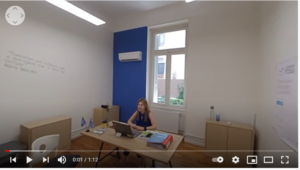Logistic

THEORETICAL FRAMEWORK
General:
To familiarise with Greek public offices and basic Greek legal procedures
To familiarise with Greek vocabulary related to legal system
To foster emotional security among immigrants
Specific goals` taxonomy according to Bloom
A) Cognitive goals:
-
to learn about the basics of the Greek legal system
-
to introduce vocabulary related to the Greek legal system and procedures
- to learn about visiting Greek public offices
B) Emotional goals:
-
to ensure emotional security in terms of using public offices
C) Psychomotor goals:
-
to prepare for fighting stereotypes of the local Greek legal system
-
to develop readiness to participate in public life
acquaintance with basics of legal system, readiness to participate in public life
Trajectory of the teaching process
The following teaching session aims to introduce immigrants with basic Greek offices routines and basic Greek legal documents and procedures. During the session participants will be presented step by step with procedures at Law Office. Throughout VR movies they will immerse into Greek Low Office and basic vocabulary.
Warm up game: “Name Card” activity.
Presenter shows card with his/hers name written and tells the story about his/ her name by answering the questions:
1) What colour is you name?
2) What is a sound of your name?
3) What meaning has your name?
4) What is a symbol of your name?
Presenter hands each participant colorful card (A5 format) and asks to create their own card name – also by answering the previous questions. After 10 minutes participants share their stories and present their cards.
1. Preparation for the main part.
Presenter explains to the participants the topic and goals of today`s session.
| Activity Title | Activity Description |
|---|---|
| Before video watching | Presenter gives short presentation on basics of Greek legal system - shows and discuss sample documents, points out main offices and their functions. Before watching the VR movie “Dealing with legal documents” the presenter should make sure all participants understand the following vocabulary in Greek: Presenter welcomes any questions and discussion. |
| Video watching | After watching the video participants share their impressions: what was new, what was important, what was surprising, what they liked, what they did not like, what they do not understand etc. The presenter welcomes any questions and discussions. |
| After watching the video | Understanding the vocabulary Presenter divides the group into teams of 4-5 participants (from different cultural background if possible) and organises separate space to work for them. Presenter hands wooden sticks and transcripts of the videos to each team and asks to underline all vocabulary that is new and incomprehensible and write it down – one word/ expression on one wooden stick. After that groups meets together and present the vocabulary. One person form the group shares one single word/ expression and puts it in the middle – any other group that has chosen the same vocabulary put their wooden stick next to it. Presenter explains what it means (supported by presentation/ videos/ pictures if needed). After finishing the task presenter makes sure all vocabulary is understandable. |
| After watching video | Two activities for checking the understanding of vocabulary |
Sum Up
Presenter sums up what the group has discussed and learnt during the session. It is time for free questions, too. Presenter introduce the homework.
Voluntary homework task: Find Citizen`s Service Centre in your area – visit it and get your ID cards.